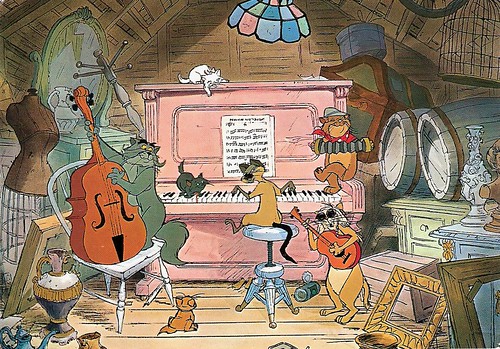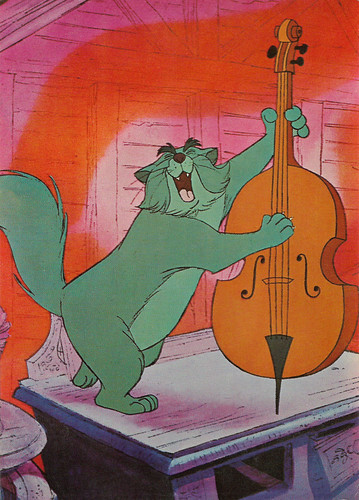The AristoCats (Wolfgang Reitherman, 1970) was the 20th animated feature film produced by Walt Disney Productions. The film is based on a story by Tom McGowan and Tom Rowe, and revolves around a Parisian family of aristocratic cats.

Italian postcard by Grafiche Biondetti, Verona. Illustration: Walt Disney Productions. Publicity still for The AristoCats (Wolfgang Reitherman, 1970).

French postcard by MD, no. D 870-1. Illustration: Walt Disney Productions. Publicity still for The AristoCats (Wolfgang Reitherman, 1970).

French postcard. Illustration: Walt Disney Productions. Publicity still for The AristoCats (Wolfgang Reitherman, 1970).

Italian postcard by Grafiche Biondetti, no. 117/4. Illustration: Walt Disney Productions. Publicity still for The AristoCats (Wolfgang Reitherman, 1970).

Italian postcard by Grafiche Biondetti, Verona, no. 117. Illustration: Walt Disney Productions. Publicity still for The AristoCats (Wolfgang Reitherman, 1970).

French postcard by Editions Kroma. Illustration: Walt Disney Productions. Publicity still for The AristoCats (Wolfgang Reitherman, 1970).
The AristoCats (Wolfgang Reitherman, 1970) is set in Paris 1910. Mother cat Duchess and her three kittens, Berlioz, Marie and Toulouse live with retired opera diva Madame Adelaide Bonfamille, and her English butler, Edgar.
The kittens are pianist Berlioz, painter Toulouse and sanctimonious Marie. The family is set to inherit a fortune from their owner. While preparing her will with lawyer Georges Hautecourt, madame Adelaide Bonfamille declares her fortune to be left to her cats until their deaths, and thereafter to Edgar.
Edgar hears this through a speaking tube, and plots to eliminate the cats. The jealous butler drugs them by putting sleeping pills in a milk mixture intended for them, and kidnaps the cats. He leaves them in the country, so he can gain his mistress's fortune.
In the morning, Duchess meets an alley cat named Thomas O'Malley, who offers to guide her and the kittens to Paris. , the family of felines tries to make it back home.
Edgar tries to cover his tracks and catch them at return, but more animals turn on him, from the cart horse Frou-Frou to the tame mouse Roquefort and O'Malley's jazz friends.

French postcard by MD, Paris, no. D 870-4. Illustration: Walt Disney Productions. Publicity still for The AristoCats (Wolfgang Reitherman, 1970).

Italian postcard by Grafiche Biondetti, Verona, no. 117/2. Illustration: Walt Disney Productions. Publicity still for The AristoCats (Wolfgang Reitherman, 1970).

French postcard. Illustration: Walt Disney Productions. Publicity still for The AristoCats (Wolfgang Reitherman, 1970).

Italian postcard by Grafiche Biondetti, Verona, no. 3119. Illustration: Walt Disney Productions. Publicity still for The AristoCats (Wolfgang Reitherman, 1970).

French postcard. Illustration: Walt Disney Productions. Publicity still for The AristoCats (Wolfgang Reitherman, 1970).

French postcard. Illustration: Walt Disney Productions. Publicity still for The AristoCats (Wolfgang Reitherman, 1970).

French postcard. Illustration: Walt Disney Productions. Publicity still for The AristoCats (Wolfgang Reitherman, 1970).
In 1962, The AristoCats began as an original script for a two-part live-action episode for Walt Disney's Wonderful World of Color, developed by writers Tom McGowan and Tom Rowe and producer Harry Tytle.
Following two years of re-writes, Walt Disney suggested the project would be more suitable for an animated film, and placed the project in turnaround as The Jungle Book advanced into production.
When The Jungle Book was nearly complete, Disney appointed Ken Anderson to develop preliminary work on The Aristocats, which would mark the last film project to be approved by Disney before his death in December 1966.
The result is charming with great songs like 'Everybody wants to be a cat'. The visual style is deliberately similar to what was used in 101 Dalmatians with the characters having a deliberately sketchy look - an art style used to great effect.
The colour is superb, the humour is constant and the mere fact that the storyline bears a resemblance to the 101 Dalmatians plot does nothing to weaken the film. The AristoCats (Wolfgang Reitherman, 1970) was released in December 1970, to positive reception, and was a box office success.

French postcard by MD, Paris, no. D 870-3. Illustration: Walt Disney Productions. Publicity still for The AristoCats (Wolfgang Reitherman, 1970).

Italian postcard by Grafiche Biondetti, no. 117. Illustration: Walt Disney Productions. Publicity still for The AristoCats (Wolfgang Reitherman, 1970).

French postcard by MD, Paris, no. D 870-2. Illustration: Walt Disney Productions. Publicity still for The AristoCats (Wolfgang Reitherman, 1970).

French postcard. Illustration: Walt Disney Productions. Publicity still for The AristoCats (Wolfgang Reitherman, 1970).

French postcard by Chromovogue, no. D 850 - 3. Illustration: Walt Disney Productions. Publicity still for The AristoCats (Wolfgang Reitherman, 1970).

Italian postcard by GTR, no. 3317. Illustration: Walt Disney Productions. Publicity still for The AristoCats (Wolfgang Reitherman, 1970).
Sources: Wikipedia and IMDb.

Italian postcard by Grafiche Biondetti, Verona. Illustration: Walt Disney Productions. Publicity still for The AristoCats (Wolfgang Reitherman, 1970).

French postcard by MD, no. D 870-1. Illustration: Walt Disney Productions. Publicity still for The AristoCats (Wolfgang Reitherman, 1970).

French postcard. Illustration: Walt Disney Productions. Publicity still for The AristoCats (Wolfgang Reitherman, 1970).

Italian postcard by Grafiche Biondetti, no. 117/4. Illustration: Walt Disney Productions. Publicity still for The AristoCats (Wolfgang Reitherman, 1970).

Italian postcard by Grafiche Biondetti, Verona, no. 117. Illustration: Walt Disney Productions. Publicity still for The AristoCats (Wolfgang Reitherman, 1970).

French postcard by Editions Kroma. Illustration: Walt Disney Productions. Publicity still for The AristoCats (Wolfgang Reitherman, 1970).
Pianist Berlioz, painter Toulouse and sanctimonious Marie
The AristoCats (Wolfgang Reitherman, 1970) is set in Paris 1910. Mother cat Duchess and her three kittens, Berlioz, Marie and Toulouse live with retired opera diva Madame Adelaide Bonfamille, and her English butler, Edgar.
The kittens are pianist Berlioz, painter Toulouse and sanctimonious Marie. The family is set to inherit a fortune from their owner. While preparing her will with lawyer Georges Hautecourt, madame Adelaide Bonfamille declares her fortune to be left to her cats until their deaths, and thereafter to Edgar.
Edgar hears this through a speaking tube, and plots to eliminate the cats. The jealous butler drugs them by putting sleeping pills in a milk mixture intended for them, and kidnaps the cats. He leaves them in the country, so he can gain his mistress's fortune.
In the morning, Duchess meets an alley cat named Thomas O'Malley, who offers to guide her and the kittens to Paris. , the family of felines tries to make it back home.
Edgar tries to cover his tracks and catch them at return, but more animals turn on him, from the cart horse Frou-Frou to the tame mouse Roquefort and O'Malley's jazz friends.

French postcard by MD, Paris, no. D 870-4. Illustration: Walt Disney Productions. Publicity still for The AristoCats (Wolfgang Reitherman, 1970).

Italian postcard by Grafiche Biondetti, Verona, no. 117/2. Illustration: Walt Disney Productions. Publicity still for The AristoCats (Wolfgang Reitherman, 1970).

French postcard. Illustration: Walt Disney Productions. Publicity still for The AristoCats (Wolfgang Reitherman, 1970).

Italian postcard by Grafiche Biondetti, Verona, no. 3119. Illustration: Walt Disney Productions. Publicity still for The AristoCats (Wolfgang Reitherman, 1970).

French postcard. Illustration: Walt Disney Productions. Publicity still for The AristoCats (Wolfgang Reitherman, 1970).

French postcard. Illustration: Walt Disney Productions. Publicity still for The AristoCats (Wolfgang Reitherman, 1970).

French postcard. Illustration: Walt Disney Productions. Publicity still for The AristoCats (Wolfgang Reitherman, 1970).
Everybody wants to be a cat
In 1962, The AristoCats began as an original script for a two-part live-action episode for Walt Disney's Wonderful World of Color, developed by writers Tom McGowan and Tom Rowe and producer Harry Tytle.
Following two years of re-writes, Walt Disney suggested the project would be more suitable for an animated film, and placed the project in turnaround as The Jungle Book advanced into production.
When The Jungle Book was nearly complete, Disney appointed Ken Anderson to develop preliminary work on The Aristocats, which would mark the last film project to be approved by Disney before his death in December 1966.
The result is charming with great songs like 'Everybody wants to be a cat'. The visual style is deliberately similar to what was used in 101 Dalmatians with the characters having a deliberately sketchy look - an art style used to great effect.
The colour is superb, the humour is constant and the mere fact that the storyline bears a resemblance to the 101 Dalmatians plot does nothing to weaken the film. The AristoCats (Wolfgang Reitherman, 1970) was released in December 1970, to positive reception, and was a box office success.

French postcard by MD, Paris, no. D 870-3. Illustration: Walt Disney Productions. Publicity still for The AristoCats (Wolfgang Reitherman, 1970).

Italian postcard by Grafiche Biondetti, no. 117. Illustration: Walt Disney Productions. Publicity still for The AristoCats (Wolfgang Reitherman, 1970).

French postcard by MD, Paris, no. D 870-2. Illustration: Walt Disney Productions. Publicity still for The AristoCats (Wolfgang Reitherman, 1970).

French postcard. Illustration: Walt Disney Productions. Publicity still for The AristoCats (Wolfgang Reitherman, 1970).

French postcard by Chromovogue, no. D 850 - 3. Illustration: Walt Disney Productions. Publicity still for The AristoCats (Wolfgang Reitherman, 1970).

Italian postcard by GTR, no. 3317. Illustration: Walt Disney Productions. Publicity still for The AristoCats (Wolfgang Reitherman, 1970).
Sources: Wikipedia and IMDb.
No comments:
Post a Comment